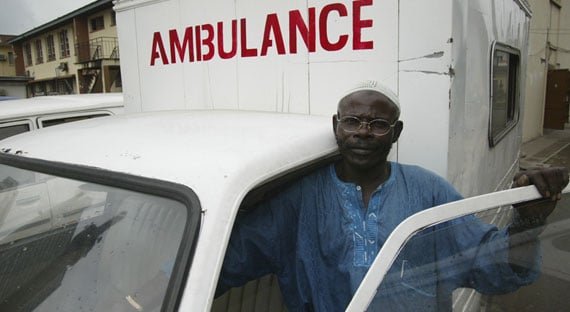
An ambulance driver in a hospital, Lagos, Nigeria. The IMF’s financial assistance to Nigeria will provide critical support to shore up the country’s heath care sector and to protect jobs and businesses. (photo: R3957 Ton Koene/TON KOENE/Newscom)
Nigeria’s IMF Financial Assistance to Support Health Care Sector, Protect Jobs and Businesses
April 30, 2020
The IMF has approved its largest COVID-19 emergency financing package so far—a US$3.4 billion Rapid Financing Instrument (RFI) for Nigeria. The country has been hit hard by the coronavirus, particularly because of the associated plunge in the price of oil—Nigeria’s top export commodity.
Related links
In a conversation with IMF Country Focus, the IMF’s mission chief for Nigeria, Amine Mati, described the economic situation confronting Nigeria, and how the country will use the money negotiated with the IMF.
What has been the impact of COVID-19 on Nigeria?
The COVID-19 pandemic is severely impacting economic activity in Nigeria. The country’s main export commodity is oil, which represents around 90 percent of its exports. The sharp fall in international oil prices, together with reduced global demand for oil, is worsening the country’s fiscal and external positions. The country’s oil exports are expected to fall by more than US$26 billion.
The economy—which remains highly reliant on foreign exchange proceeds and the recycling of petrodollars—is expected to contract by about 3.4 percent in 2020, a 6-percentage point drop compared to pre-COVID-19 projections. With the decline in economic activity, large fiscal and external financing gaps have emerged.
What are the risks to the growth outlook for Nigeria?
Our baseline scenario is uncertain and subject to heightened risks. These are mostly linked to a further collapse in oil revenue—due to persistent low oil prices, an inability to sell oil because of depressed global demand, or declining production because of additional OPEC-agreed cuts. Our growth outlook also assumes the COVID-19 spread in Nigeria is contained in the second half of 2020. If these measures fail to contain the virus or domestic infections rise, the economic recovery would be slower and gaps would become even larger.
What emergency assistance can the IMF provide to Nigeria?
To help alleviate the impact of the COVID-19 pandemic and the sharp fall in oil prices, Nigeria requested emergency assistance of about US$3.4 billion—equivalent to 100 percent of its quota— under the IMF’s RFI. The financial support—approved by the IMF Executive Board on April 28, 2020—will provide critical support to shore up Nigeria’s heath care sector, and shield jobs and businesses from the shock of the COVID-19 crisis. It will also help limit the decline in international reserves.
Why is the RFI the best way to borrow for Nigeria?
The RFI is a loan that is repaid in 5 years, with repayments starting in the third year. It currently costs 1 percent in annual interest—which is about one tenth of the current risk premium on Nigeria’s sovereign bond. Unlike the IMF’s standard financial package, there are no ex post conditions attached to this emergency loan.
However, a member country requesting RFI assistance is required to cooperate with the IMF to solve its balance of payments difficulties, and to describe the general economic policies that it proposes to follow.
Why didn’t Nigeria benefit from recent IMF debt service relief?
On April 13, the IMF Executive Board approved immediate debt service relief to 25 of the IMF’s member countries under the IMF’s revamped Catastrophe Containment and Relief Trust (CCRT)—a part of the Fund’s response to help address the impact of the COVID-19 pandemic. Nigeria was not included in the list of beneficiary countries for this initiative because Nigeria had no outstanding debt owed to the IMF at that time.
What measures will be introduced to ensure RFI money is used for its intended purpose?
To enhance transparency and governance, the Nigerian authorities committed to undertake an independent audit of crisis-mitigation spending and related procurement processes, and to publish procurement plans and notices for all emergency-response activities, including the names of awarded companies and beneficial owners.
Special budget lines are to be created to record all crisis emergency response measures, which are published daily on Nigeria’s treasury online portal. These measures will not only ensure financial assistance received as part of the COVID-19 response is used for its intended purposes, but also significantly strengthen the oversight of the entire budget used for the government’s crisis response.


